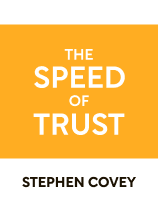

This article is an excerpt from the Shortform book guide to "The Speed of Trust" by Stephen M. R. Covey. Shortform has the world's best summaries and analyses of books you should be reading.
Like this article? Sign up for a free trial here .
What is Stephen Covey’s trust equation and how can you use it? How does measuring trust help you predict your success?
Stephen Covey outlined the trust equation in his book The Speed of Trust, a guide for leaders and individuals teaching the importance of cultivating and leveraging trust in relationships. The trust equation creates a simple way for readers to determine the likelihood of success based on the factors of trust, strategy, and execution.
Keep reading for an explanation of Stephen Covey’s trust equation, including how to apply it to your own situation.
Why Trust Is Important
Trust makes existing relationships more productive and efficient, opens the door to new relationships and opportunities, builds loyalty and respect, and fosters innovation and collaboration. In short, more than any other asset, trust is the key to success. In The Speed of Trust, Stephen M.R. Covey explains why trust is a game-changer in every personal and professional relationship. Stephen Covey’s trust equation lays out a roadmap for building and leveraging trust for success.
Stephen Covey’s Trust Equation Explained
To understand Stephen Covey’s trust equation, it’s important to note that trust dictates the results of your efforts. Covey represents this idea by modifying the classic business equation, Results = Strategy x Execution to Results = Trust (Strategy x Execution). As Stephen Covey’s trust equation shows, given the same strategy and execution, high trust magnifies your results while low trust minimizes them.
For example, say a contractor with a good reputation and community connections has worked under someone else for a long time and is ready to start their own business. They may only need to put marginal effort into the strategy and execution of their independent venture because, thanks to the trust they have built with customers, business will come to them. In contrast, if the same contractor moved to a new city to open their business, they would need to work much harder to get up and running (developing their brand, marketing themselves, looking for jobs, and so on) because they don’t yet have the benefit of community trust.
| Example of Stephen Covey’s Trust Equation: Marketing & Referrals Referrals are one of the most effective forms of marketing, and they are based on trust. The efficiency of referrals illustrates Stephen Covey’s trust equation (Results = Trust [Strategy x Execution]) since they can cost a company almost nothing (low strategy and execution) while bringing in new business (high results). The low investment and high return from referrals is an effective way for small businesses to capitalize on trust dividends, as businesses that have earned customers’ trust can get new customers from referrals without effortful marketing. For example, you might know a great handywoman with no website, no business cards, and no office, but whose phone rings off the hook with calls from people who get her number from a friend. |
Quantifying Trust With Trust “Accounts”
Trust can be challenging to quantify, making it difficult to factor it into your decision-making. Aside from Stephen Covey’s trust equation, he also offers a framework for quantifying trust, which we will summarize next.
Trust Taxes and Trust Dividends
Covey refers to the impact of trust on results as either a “trust tax” or a “trust dividend.” When trust is high, you reap “trust dividends;” when trust is low, you pay “trust taxes” on every interaction. The “units” on your trust taxes and dividends can be in dollars and cents, time and resources, or even emotional energy.
For example, say you decline the offer to sell your house to the wealthy investor and sell it directly to a close friend instead. Because your friend trusts that you will give them a fair price and disclose any major issues, you forgo realtors and save thousands of dollars on commissions. You also save months of time and energy putting your house on the market, scheduling showings, and waiting for closing dates. Finally, you gain the emotional benefit of knowing that your house will remain a loving home. All of these are your trust dividends.
As an example of a trust tax, say after you sell your friend the house, they realize you didn’t disclose an active pest infestation. When they realize you violated their trust, your relationship will suffer, and your reputation in the community might suffer, which could impact your future opportunities. Finally, your friend might successfully sue you for a large sum.
(Shortform note: In an interview for Forbes Magazine, Covey was pressed for real-world evidence of trust taxes and dividends. He cited a study showing that organizations classified as “high-trust” performed 286% better than companies classified as “low-trust.” Additionally, he noted a study from the UK showing that business relationships based on trust performed 40% better than relationships based on contracts. Finally, he explained that the trust dividends in a high-trust work environment are so integral to a positive work culture that 60% of the criteria companies must meet to be on a Great Places to Work list are based on trust. As these statistics show, trust has a measurable impact in the real world.)

———End of Preview———
Like what you just read? Read the rest of the world's best book summary and analysis of Stephen M. R. Covey's "The Speed of Trust" at Shortform .
Here's what you'll find in our full The Speed of Trust summary :
- Why trust is the ultimate key to success
- A roadmap for building and leveraging trust
- An explanation of Steven Covey's “four cores of credibility”






